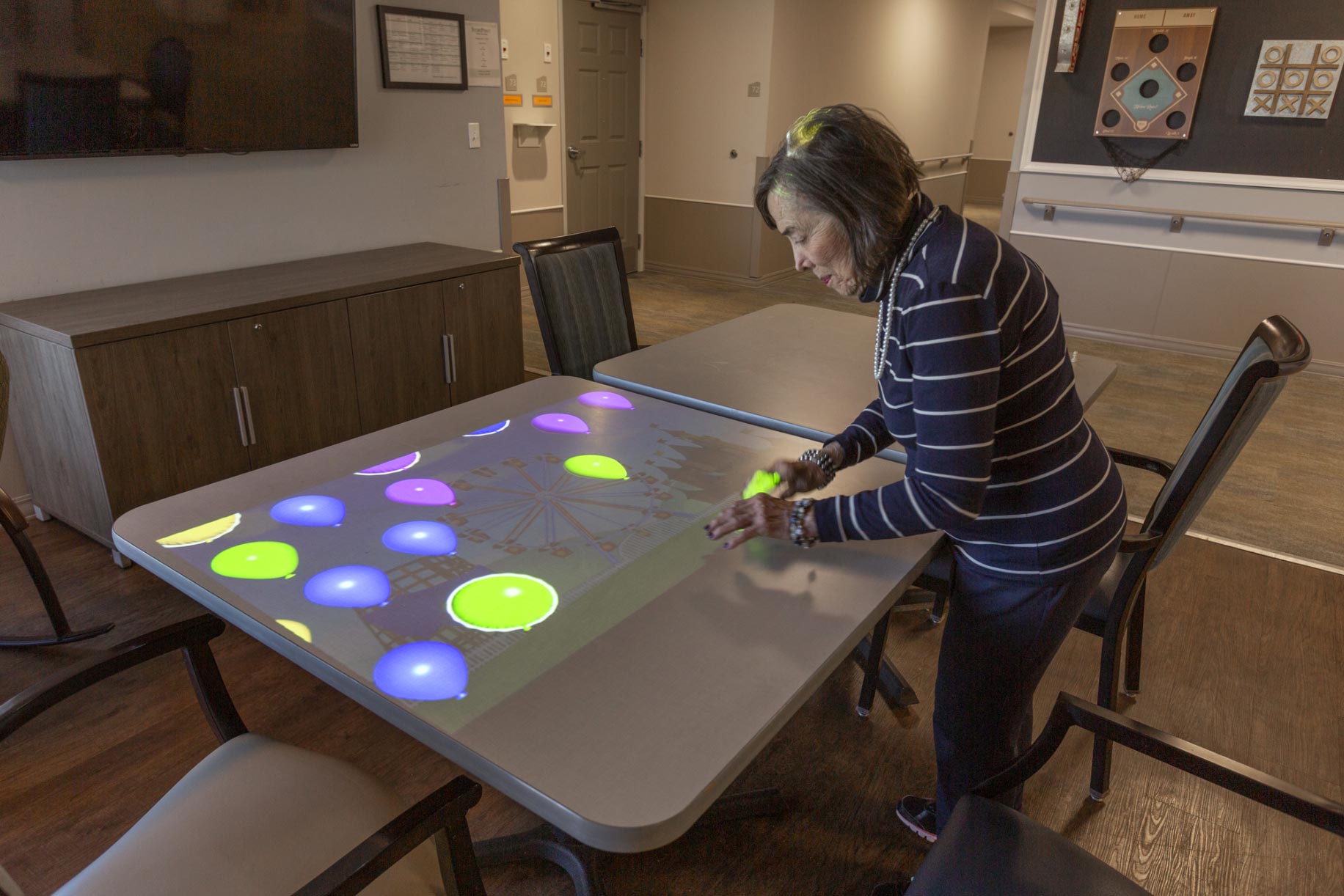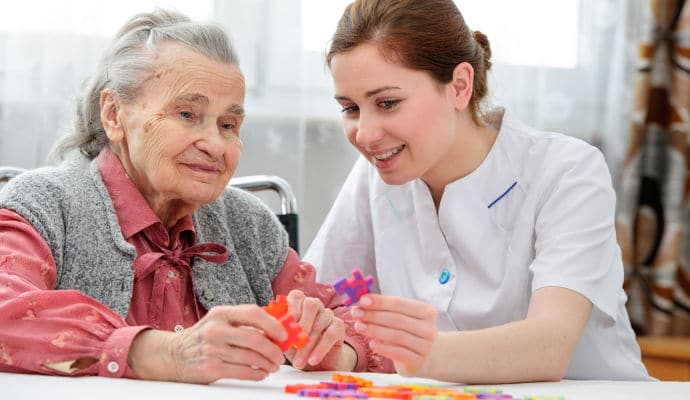Specialist and Dedicated Providers for Alzheimers Care Charlotte Residents
Specialist and Dedicated Providers for Alzheimers Care Charlotte Residents
Blog Article
Developing a Safe and Encouraging Setting for Alzheimer's Care
The production of a safe and supportive environment for people with Alzheimer's is critical in boosting their lifestyle. This entails not only physical adaptations within the home, such as decreasing hazards and integrating acquainted components, however likewise the execution of organized routines and meaningful tasks that provide to their cognitive requirements. In addition, recognizing the psychological and psychological measurements of care can substantially impact their complacency and connection. Checking out these diverse strategies can expose critical understandings into effective caregiving approaches that may transform the day-to-day experiences of both caregivers and people.
Recognizing Alzheimer's Requirements
Often, individuals with Alzheimer's illness exhibit a variety of requirements that require tailored techniques to care. As the condition proceeds, cognitive decrease materializes in various ways, affecting memory, reasoning, and even the capability to execute everyday activities. Caregivers need to identify these developing demands to offer appropriate support and make certain a better of life for those impacted.
One essential element of understanding Alzheimer's needs is recognizing the significance of routine and familiarity. Individuals often discover comfort in well established patterns, which can minimize anxiousness and confusion. Caretakers should aim to develop organized day-to-day schedules that include significant activities lined up with the person's interests and capacities.
In addition, effective communication is vital. Individuals with Alzheimer's might struggle to express themselves or comprehend intricate language. Caregivers need to use easy, clear language, use non-verbal signs, and method active paying attention to promote understanding and link.
Last but not least, social and psychological requirements can not be ignored. Supplying opportunities for social interaction and preserving connections can significantly enhance emotional wellness. Caregivers ought to encourage interaction in neighborhood activities or household celebrations, advertising a feeling of belonging and purpose. Understanding these diverse requirements is important for producing a helpful care atmosphere.
Creating a Safe Home
Creating a safe home for people with Alzheimer's disease is essential to lessening dangers and promoting self-reliance. Guarantee that pathways are well-lit and clear, as correct lighting reduces disorientation and boosts wheelchair.
Incorporating adaptive functions is likewise crucial. Mount grab bars in restrooms and near stairs, and think about utilizing non-slip floor coverings in wet locations. Additionally, making use of different shades for wall surfaces and floorings can aid in differentiating areas, aiding to reduce confusion.
Knowledge is vital for individuals with Alzheimer's. Customizing the atmosphere with familiar objects and pictures can enhance a sense of belonging and security - Alzheimers Care Charlotte. It is also beneficial to have actually a marked location for daily tasks, such as analysis or crafting, which can give framework to their day
Last but not least, applying a safe and secure exterior room enables secure expedition while getting in touch with nature. By thoughtfully creating the home environment, caretakers can dramatically enhance the quality of life for individuals dealing with Alzheimer's illness.
Enhancing Interaction Abilities

Non-verbal interaction, including faces, gestures, and touch, plays an essential duty in conveying compassion and understanding. Preserving eye call and a calm temperament can boost the convenience level of the person, promoting a sense of safety and security.
In addition, it is crucial to practice energetic listening. This includes being fully present, revealing persistence, and permitting the individual to reveal themselves without disruption. Rep may be essential; caretakers need to be prepared to revisit concerns or topics, as people with Alzheimer's might fight with memory click to find out more recall.
Furthermore, utilizing aesthetic help or hints, such as photos or acquainted items, can facilitate acknowledgment and interaction. Eventually, boosting communication abilities has to do with constructing count on and producing a setting where individuals feel heard, valued, and comprehended, thus improving their top quality of life.
Encouraging Social Interaction
Cultivating meaningful social interactions can significantly enhance the wellness of people with Alzheimer's illness. Engaging with others not only aids combat sensations of seclusion but also promotes cognitive feature and emotional health. Structured social activities, such as group games, arts and crafts, or music treatment, produce opportunities for citizens to attach with peers and caregivers, which can bring about improved state of mind and lowered anxiousness.
Producing an inviting environment that encourages socialization is crucial. This can be attained by arranging public rooms that promote interaction, such as comfy seating areas or task spaces. Furthermore, including culturally appropriate and acquainted activities can stimulate memories and motivate participation, enabling individuals with Alzheimer's to feel more linked to their past experiences.
Furthermore, caregivers ought to be educated to recognize and promote social involvement amongst residents. By prioritizing social interaction, we can considerably enrich the lives of those living with Alzheimer's, promoting a sense of area and belonging.
Supporting Caretaker Well-being

To support caretakers, companies must provide regular training and educational resources to improve their understanding of Alzheimer's illness and caregiving techniques. Providing accessibility to reprieve treatment solutions permits caretakers to take essential breaks, decreasing stress and fatigue - Alzheimers Care Charlotte. Furthermore, cultivating a neighborhood via assistance groups can facilitate psychological sharing and the exchange of useful suggestions amongst caretakers, producing a network of shared assistance
Mental health resources, such as counseling solutions, can also be essential in attending to the psychological toll caregiving can take. By focusing on caregiver well-being, we create a more lasting caregiving atmosphere that not just profits the caregivers themselves however likewise boosts the total quality of treatment gotten by individuals with Alzheimer's. Eventually, supporting caretakers is a vital element in promoting a caring and reliable treatment setup.
Final Thought
In final thought, the production of a secure and helpful setting for individuals with Alzheimer's is important to boosting their top quality of life. By prioritizing security through thoughtful design, cultivating psychological well-being with acquainted aspects, and promoting interaction through structured regimens, caretakers can dramatically affect the overall experience of those affected by this problem. Furthermore, sustaining caretaker health is critical, as it eventually adds to a much more efficient and compassionate treatment atmosphere.
Repeating may be essential; caregivers must be prepared to take another look at questions or subjects, as people with Alzheimer's might struggle with memory their explanation recall.

Report this page